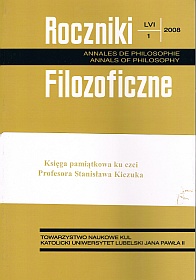Four Motives of Kant’s Idealism and their Criticism
Abstract
The paper presents some principal motives that made I. Kant take the position of transcendental idealism. They are the following: the question of a priori synthetic judgements, the question of the cognitive and ontic status of space and time, the problem of the constitution of the phenomenal world, and the problem of the objectivity of empirical judgments (the so-called transcendental deduction). In relation to Kant’s solutions some objections have been formulated and a thesis that neither separately nor in combination can the main four motives be treated as conditions sufficient for idealism and agnosticism. The author also seeks to show the relationship between transcendental idealism and Kant’s belief of the impossibility to solve the “great” metaphysical problems, therefore the problem of the existence of God, soul, and freedom.
References
Allison H.: Kant’s Transcendental Idealism. An Interpretation and Defense, New Haven: Yale University Press 1983.
Falkenstein L.: Kant’s Argument for the Non-Spatiotemporality of Things in Themselves, „Kant-Studien” 80 (1989), z. 3, s. 265-283.
Guyer P.: Kant and the Claims of Knowledge, New York Cambridge University Press 1987.
Ingarden R.: O motywach, które doprowadziły Husserla do transcendentalnego idealizmu, [w:] tenże, Z badań nad filozofia współczesną, Warszawa: PWN 1963, s. 550-622,
Ingarden R.: Poznanie a priori u Kanta a poznanie a priori u Husserla, w: tenże, U podstaw teorii poznania, Warszawa: PWN 1971, s. 246-264.
Ingarden R.: Spór o istnienie świata, Warszawa: PWN 19873.
Kant I.: Krytyka czystego rozumu, tłum. R. Ingarden, Warszawa: PWN 1986.
Ingarden R.: Prolegomena, tłum. B. Bornstein, Warszawa: PWN 1993.
Ingarden R.: Jedyna możliwa podstawa dowodu na istnienie Boga, tłum. zbiorowe, Wydawnictwo Antyk, Kęty: Antyk 2004.
Kitcher P.: Kant’s Epistemological Problem and Its Coherent Solution, [w:] J. E. Tomberlin (red.), Philosophical Perspectives, 13 Epistemology, 1999, Malden, MA–Oxford: Blackwell Publishers 1999, s. 415-441.
Kitcher P. H.: Kant and the Foundations of Mathematics, „Philosophical Review” 84 (1975), s. 30-31.
Paton H..J.: Kant’s Metaphysic of Experience, London: George Allen & Unwin LTD 1951.
Vaihinger H.: Commentar zu Kants Kritik der reinen Vernunft, t. 2, Stuttgart 1922.
Vleeschauwer de H. J.: La Déduction transcendantale dans l’œuvre de Kant, t. 1: La Déduction transcendantale avant la Critique de la raison pure, Anvers–Paris–La Haye: De Sikkel – Libraire Ernest Leroux – Martinus Nijhoff 1934.
Vleeschauwer de H. J.: La Déduction transcendantale dans l’œuvre de Kant, t. 2: La déduction transcendantale de 1781 jusqu’à la deuxième édition de la Critique de la raison pure (1887), Anvers–Paris–La Haye: De Sikkel – Libraire Ernest Leroux – Martinus Nijhoff 1936.
Vleeschauwer de H. J.: La Déduction transcendantale dans l’œuvre de Kant, t. 3: La Déduction transcendantale de 1787 jusqu’à l’Opus Postumum, Anvers–Paris–La Haye: De Sikkel – Libraire Ernest Leroux – Martinus Nijhoff 1937.
Copyright (c) 2008 Roczniki Filozoficzne

This work is licensed under a Creative Commons Attribution-NonCommercial-NoDerivatives 4.0 International License.





